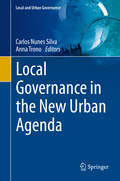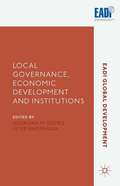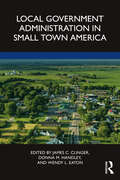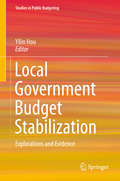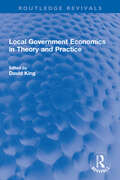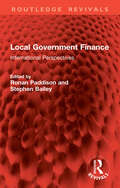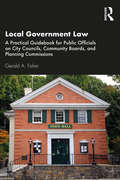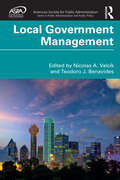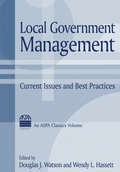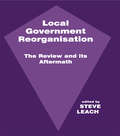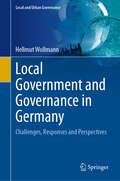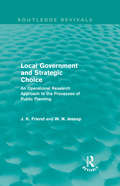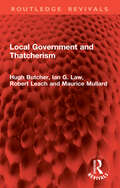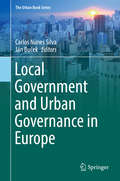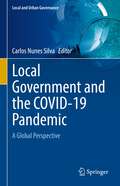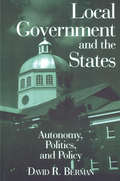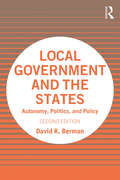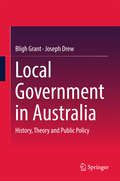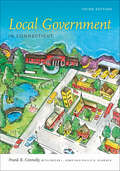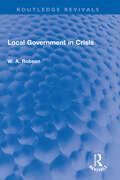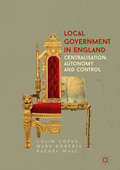- Table View
- List View
Local Governance in the New Urban Agenda (Local and Urban Governance)
by Anna Trono Carlos Nunes SilvaThe book explores and discusses some of the changes, challenges and opportunities confronting local governance in the context of the new urban paradigm associated with the HABITAT III New Urban Agenda, a 20-year strategy for sustainable urbanization, adopted in October 2016 in Quito, Ecuador. The chapters included in the book address public policy issues from different theoretical perspectives and methodological approaches, written by authors from different academic disciplines within the broad area of social sciences (Geography, Political Science, Public Administration, Spatial Planning, Law, Regional Science, among other fields), and offer an inter-disciplinary vision of these issues. The chapters are written by members of the International Geographical Union (IGU) Commission on Geography of Governance.
Local Governance, Economic Development and Institutions (EADI Global Development Series)
by Peter Knorringa Georgina GómezLocal Government Administration in Small Town America
by James C. Clinger Donna M. Handley Wendy L. EatonIn government administration and leadership, rural community leaders face unique challenges in delivering public services including (but not limited to) education, health care, and public safety. Meanwhile, residents who live in smaller and more isolated rural settings often face greater difficulties accessing provisions and services or commuting to work, among other economic development challenges. These factors may affect a community’s resiliency to and recovery from shocks such as the COVID-19 pandemic. Local Government Administration in Small Town America devotes some overdue scholarly attention to the governance and administration of public programs in small towns and rural communities in the United States.The chapter contributors to this volume analyze some of the unique challenges rural communities face, as well as the policy tools that their governments employ to address them. The book explores ways that small town governments collaborate with one another, the state, and the federal government, and examines how local government officials use knowledge of people and place to improve policy performance. The chapters are designed to provide cases and strategies for students and practitioners in public administration to use in a small town environment, while also considering a community’s distinctive social and political culture, which determines how local political leaders and government practitioners might respond to demands and challenges they face. Local Government Administration in Small Town America is an essential resource for undergraduate and graduate students studying local government, as well as for rural practitioners navigating evolving challenges unique to their communities.
Local Government Budget Stabilization
by Yilin HouThis book is the first comprehensive, full-scale treatment of the politics, law, and economics with regard to the policies and policy instruments for budget stabilization at the local level. It examines budget stabilization in the United States from the 1910s to 2010 (from adoption of public budgeting in this country through the Great Recession). In addition, it provides details on the methods and results of empirical tests of the effects of budget stabilization instruments on government operations, key/basic services provision, and some other aspects of social and economic life at the local level, including full-purpose governments (county, metro city, municipality, township, and village) as well as special (single-) purpose governments (like school districts and transportation districts). This book dissects an important and pressing issue in public financial administration, analyzes a lesson that has been in the learning process, especially in the United States, and identifies theoretical threads for scholarly refinement, which will be put into specific contexts of policy design and implementation. This book will be of interest to scholars in political science, economics, public choice and in public administration, where it will also appeal to policy-makers.
Local Government Economics in Theory and Practice (Routledge Revivals)
by David KingFirst published in 1992, Local Government Economics in Theory and Practice is an effort to rectify the lack of a comparative analysis between democratic local governments of various countries and their methods of financing. A series of chapters examines the theoretical basis for different systems of local government finance and how these systems work out in practice. The book covers various aspects of reforms in the United Kingdom and elsewhere, and includes a discussion of the rationale for the community charge. This collection of essays will be of importance to students of economics and public policy.
Local Government Finance: International Perspectives (Routledge Revivals)
by Ronan Paddison Stephen BaileyOriginally published in 1961, this book became widely used as a textbook, as an important source of primary data on British government expenditure statistics and as the point of departure for further empirical and analytical studies of the behaviour of governments. The book was recognised as one of the formative influences in the development of a positive theory of government expenditure which sought to explain the size and structure of the system of public finance rather than justify it
Local Government Innovativeness in China (Routledge Focus on Public Governance in Asia)
by Youlang ZhangLocal government innovation has become one of the most important topics on China’s policy agenda in recent decades. This book explains why some local governments are more innovative than others. This book uses a novel theoretical framework and points out that in China’s multi-level government structure, the administrative hierarchy and the span of control could shape local governments’ innovation motivation, innovation capability, and innovation opportunity, thus influencing local government innovativeness. The author systematically analysed the 177 winners and finalists of the biennial Innovations and Excellence in Chinese Local Governance (IECLG) Awards Programme from 2001 to 2015 to provide convincing empirical evidence to support this theory.This book adopts an institutional approach to explaining local government innovativeness in China and may be a useful reference to help us learn more about local government decisions and behaviours.
Local Government Law: A Practical Guidebook for Public Officials on City Councils, Community Boards, and Planning Commissions
by Gerald A. FisherLocal Government Law provides a unique resource with concise, easy-to-understand explanations of important legal issues faced by local public officials, community boards, and city councils. From the moment officials take office, they face decisions related to basic principles found in state and federal law. The same is true for those in the private sector aiming to work successfully with local governments. This practical guidebook will empower public and private representatives with a functional grasp of legal principles, with chapters explaining what a local government is, the requirement to follow due process, local land use controls, the basics of the Freedom of Information Act, and many other important subjects that regularly arise. As a practical guidebook on local government law, this book provides a basic and empowering understanding for officials and private actors in the local government arena.
Local Government Management (ASPA Series in Public Administration and Public Policy)
by Nicolas A. Valcik and Teodoro J. BenavidesIn a recent paradigm shift, local governments find themselves shouldering more responsibility for day-to-day governance and crisis management, thanks to regulations and federal spending cuts. While 20 years ago a book on local government administration might have been considered complete with chapters on budgeting, public personnel management, productivity and responsivity, and community engagement, any discussion of local government must now also include resilience, emergency management, climate change, smart cities, social media, and infrastructure funding. Bringing together key voices from the academic and public sectors, Local Government Management offers techniques and insight into how local government can most effectively lead and manage their resources in an evolving political—and environmental—landscape. Featuring examples from expert contributors’ own decades of public service and research, this forward-thinking book explores the rapid speed of change in local communities and the need for local government to not only adapt but also proactively plan for the future. Local Government Management is essential reading for local government officials, public stakeholders, practitioners, and students of public administration and management.
Local Government Management: Current Issues and Best Practices
by Douglas J. Watson Wendy L. HassettSome of the very best writings on issues involving local government can be found in journals published by the American Society for Public Administration or journals with which ASPA is associated. This volume includes thirty of the most outstanding articles that have been published over the past sixty years in these journals. Local Government Management is an ideal supplement for any course in local management and administration, whether the audience is students or practicing professionals.
Local Government Police Management
by Jan S. Bashinski Cornelius J. Behan John A. Calhoun David L. Carter Gary Cordner Edwin J. Delattre Edward A. Flynn William A. Geller Sheldon Greenberg Richard N. Holden Clifford L. Karchmer George L. Kelling Karen S. Layne Stephen D. MastrofskiA book aimed at developing and supporting police executives serving the nation's cities and counties.
Local Government Reform in England: 1888 - 1974 (Routledge Revivals)
by Jack BrandOriginally published in 1974, this study concerns the politics of local government reform between 1942-1974 and describes the struggles between the Ministries, the Local Government Associations and political parties. The political manoeuvrings of the various groups involved are analysed and a theory proposed about the reform of political structures in general.
Local Government Reorganisation: The Review and its Aftermath
by Steve LeachThe Local Government Review raised issues of political process and decision-making theories. The interest lies in the insights provided by academic analysis, and the highlighting of the lessons to be learned. This volume attempts to respond to both these perspectives.
Local Government and Governance in Germany: Challenges, Responses and Perspectives (Local and Urban Governance)
by Hellmut WollmannThe book aims at outlining key political, functional, administrative and financial features of Germany’s local government system and at placing them in a (European) comparative perspective. In pursuing an “institutionalist” approach it focuses on discussing whether, how and why the position and activities of local government in the intergovernmental (“multi-level”) setting have changed vis-à-vis multiple challenges and crises. Among the latter tasks such as coping with the energy crisis, the influx of asylum seekers and refugees, the digitization of local administration and the Covid19 pandemic loom large. Ranking among the functionally and politically strongest among European countries Germany’s local government plays an important role in the German federal system and beyond in the European Union. Over the years it has proved a remarkable problem solving and innovative capacity. Hence, the German case may attract the attention of a European and international audience interested in local government and governance and practices.
Local Government and Strategic Choice: An Operational Research Approach to the Processes of Public Planning (Routledge Revivals)
by John Friend Neil JessopFirst published in 1969, this book is concerned with the processes of policy-making in local government. The authors address themselves to the basic challenge of planning in a democracy and consider issues such as how those elected to exercise choice on our behalf can preserve and expand their capacity to choose discriminatingly, when the sheer complexity of the issues facing them tends all the time to make them increasingly dependent on the skills and judgements of their professional advisers. This question is explored in relation to the many different, yet interdependent, aspects of the planning process which impinge on any local community – with particular reference to the planning of housing, transport, education, and shopping, of land use and local government finance. The book is the outcome of a four-year program of research during which a mixed team of operational research and social scientists was given a unique opportunity to observe the ways in which decisions were made and plans formulated in one particular city- Coventry. It covers both political and professional aspects of local government in 1960s Great Britain and has had important implications for urban governments throughout the world.
Local Government and Thatcherism (Routledge Revivals)
by Robert Leach Maurice Mullard Hugh Butcher Ian G. LawThe 1980s witnessed an unprecedented series of initiatives aimed at transforming the role and manner of local government operations in Britain. First published in 1990, Local Government and Thatcherism provides a clear and up-to-date framework for understanding the impact of ‘Thatcherism’ on local government during this period and explores future prospects.The authors examine the effect of the ‘Thatcher Revolution’ on the policy and practice of local government, looking at the role of ideology in key policy areas such as finance, public services, local economic development, race, and decentralization. Beginning with an analysis of the evolution of local government, the authors situate Thatcherism in the context of ‘Municipal Toryism’, and discuss changes in local finance, including the introduction of the community charge. They focus on changes in public policy, particularly innovations like grant-maintained schools and Housing Action Trusts and look in detail at economic regeneration and equal opportunities, two areas in local policy development which are increasingly under threat from centralizing tendencies. The authors conclude that the revolution in local government is aimed at nothing less than recasting the local socio-political order and political process. Coming to terms with these challenges, they believe, will change the face of local government in 1990s; the contract authority, the enterprising authority, and the business-corporatist authority.Lucid and stimulating, this discussion will be invaluable to students of British politics, and public and social administration, and to all those who wish to know more about the future of local government.
Local Government and Urban Governance in Europe
by Ján Buček Carlos Nunes SilvaThis book discusses innovative responses and reforms developed in critical areas of urban governance in European countries. It examines the impact of European Union's policies on the urban agenda and on local governance, and the impact of the transition to democracy in Central and in Southern Europe on local self-government systems. The book is divided into three parts: i) Crisis, Reform and Innovation in Local Government; ii) EU Policies, the Urban Agenda and Local Governance; and iii) Citizen Participation in Local Government. Providing an extensive and updated overview of key challenges in the governance of cities in Europe, the book will be of interest to students and researchers in the broader field of urban studies, and for policy-makers, especially those engaged in urban governance in European countries.
Local Government and the COVID-19 Pandemic: A Global Perspective (Local and Urban Governance)
by Carlos Nunes SilvaThe book provides a global perspective of local government response towards the COVID-19 pandemic through the analysis of a sample of countries in all continents. It examines the responses of local government, as well as the responses local government developed in articulation with other tiers of government and with civil society organizations, and explores the social, economic and policy impacts of the pandemic. The book offers an innovative contribution on the role of local government during the pandemic and discusses lessons for the future. The COVID-19 pandemic had a global impact on public health, in the well-being of citizens, in the economy, on civic life, in the provision of public services, and in the governance of cities and other human settlements, although in an uneven form across countries, cities and local communities. Cities and local governments have been acting decisively to apply the policy measures defined at national level to the specific local conditions. COVID-19 has exposed the inadequacy of the crisis response infrastructures and policies at both national and local levels in these countries as well as in many others across the world. But it also exposed much broader and deeper weaknesses that result from how societies are organized, namely the insecure life a substantial proportion of citizens have, as a result of economic and social policies followed in previous decades, which accentuated the impacts of the lockdown measures on employment, income, housing, among a myriad of other social dimensions. Besides the analysis of how governments, and local government, responded to the public health issues raised by the spread of the virus, the book deals also with the diversity of responses local governments have adopted and implemented in the countries, regions, cities and metropolitan areas. The analysis of these policy responses indicates that previously unthinkable policies can surprisingly be implemented at both national and local levels.
Local Government and the States: Autonomy, Politics and Policy
by David BermanThis book offers an overview of the legal, political, and broad intergovernmental environment in which relations between local and state units of government take place, the historical roots of the conflict among them, and an analysis of contemporary problems concerning local authority, local revenues, state interventions and takeovers, and the restructuring of local governments. The author pays special attention to local governmental autonomy and the goals and activities of local officials as they seek to secure resources, fend off regulations and interventions, and fight for survival as independent units. He looks at the intergovernmental struggle from the bottom up, but in the process examines a variety of political activities at the state level and the development and effects of several state policies. Berman finds considerable reason to be concerned about the viability and future of meaningful local government.
Local Government and the States: Autonomy, Politics, and Policy
by David R. BermanThis book offers an overview of the legal, political, and broad intergovernmental environment in which relations between local and state units of government take place, the historical roots of the conflict among them, and an analysis of contemporary problems concerning local authority, local revenues, state interventions and takeovers, and the restructuring of local governments. The author pays special attention to local governmental autonomy and the goals and activities of local officials as they seek to secure resources, fend off regulations and interventions, and fight for survival as independent units.Now, in a thoroughly revised second edition, this book examines marijuana use, minimum wages, the establishment of sanctuary cities, and the regulation of ride-sharing companies. Looking at the intergovernmental struggle from the bottom up, and in the process examining a variety of political activities and policies at the state level, Berman finds considerable reason to be concerned about the viability and future of meaningful local government. This book improves our understanding of the relationship between state and local governments. It provides a thoughtful look at the past, present, and possibly the future of local home rule.
Local Government in Australia
by Bligh Grant Joseph DrewThis book offers a general introduction to and analysis of the history, theory and public policy of Australian local government systems. Conceived in an international comparative context and primarily from within the discipline of political studies, it also incorporates elements of economics and public administration. Existing research tends to conceptualise Australian local government as an element of public policy grounded in an 'administrative science' approach. A feature of this approach is that generally normative considerations form only a latent element of the discussions, which is invariably anchored in debates about institutional design rather than the normative defensibility of local government. The book addresses this point by providing an account of the terrain of theoretical debate alongside salient themes in public policy.
Local Government in Britain Since Reorganisation (Routledge Revivals)
by Alan AlexanderOriginally published in 1982, this book was the first comprehensive, critical assessment of the outcome of the controversial reorganisation of British local government outside London which took place between 1973 and 1975. The book deals with the new systems in England, Wales and Scotland, drawing upon the results of almost 100 in-depth interviews with leading members and officers from Shetland to Cornwall, from major cities to rural districts. Liaison between the tiers, the effects of corporate management, the spread of the office of chief executive, the increasing levels of partisanship and the changing face of central-local relations are examined on the basis of close observation and practical experience rather than theoretical preconceptions.
Local Government in Connecticut (The Driftless Connecticut Series)
by Frank B. Connolly Rob Schenck Roger L KempOriginally published in 1992 and revised in 2001, Frank B. Connolly's Local Government in Connecticut is one of the most useful and well-established resources on the state's local government. Written expressly for public officials and students, the book explains Connecticut's basic forms of local government and its many variants, as well as examining their inner workings, including governance, management, administration, municipal services, education, and land use. This new edition has been entirely revised, expanded, and updated, with new chapters on charter revision, municipal employees and unionization, education, homeland security and local government, pensions, and economic development. It includes references to key sections of the Connecticut General Statutes. This unique and indispensable resource for the state is published in cooperation with the Connecticut Conference of Municipalities.
Local Government in Crisis (Routledge Revivals)
by W. A. RobsonFirst published in 1966, Local Government in Crisis presents a comprehensive overview of the challenges and limitations of the local government in Britain. William A. Robson discusses major themes like loss of municipal functions and public utilities; transfer of powers from county districts to county councils; increased central control and dependence on central finance; attitude of local authorities to municipal reforms; the Local Government Act, 1958; and work of the Local Government Commission, to showcase the demand for far reaching substantial changes in a) the structure and finance of local government, b) the relations of local authorities with central departments and c) the power entrusted to local councils. This book is an essential read for scholars and researchers of public administration, political science, and public policy.
Local Government in England
by Mark Roberts Colin Copus Rachel WallThe book explores the claim that English local government exists in one of the most centralised relationships with national government. Such a position fundamentally undermines any notion of local self-government and makes the term 'government' in local government a misnomer. The book will examine how the erosion of the autonomy, powers, roles, functions and responsibilities of English local government came about, the arguments of centralisers and localisers to support their view of the constitutional status of local government, and its overall role in the government of England. The book offers an antidote to the onward march of centralisation by offering a new vision of local government which emphasises both 'local' and 'government'.
